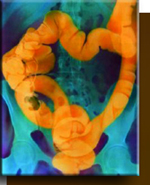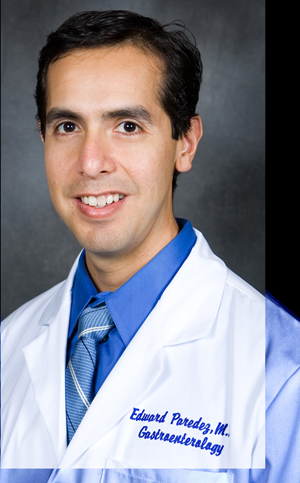Screening Important in the Decline in Incidence and Mortality
by The American Cancer Society ...The fight against colon cancer has seen much progress in the past decade with important declines attributed to prevention and early detection of the disease through screening, as well as increasingly effective treatment. Yet, despite this progress, colon cancer remains the third leading cause of cancer death in both men and women in the U.S. The American Cancer Society says some 1,150 San Diegans may be diagnosed with colon and/or rectal cancer in 2008 and almost 450 are expected to die from the disease. Wider use of proven screening tests could save more than 225 of our neighbor’s lives. ...“Colon cancer is one of only a few cancers that can be prevented through screening,” said Edward Paredez, MD, a gastroenterologist with Scripps Health and an American Cancer Society spokesperson. “Precancerous polyps, from which colon cancers often develop, can ..In most cases, colorectal cancers develop slowly over a period of several years. We now know that most of these cancers begin as a polyp--a growth of tissue that starts in the lining and grows into the center of the colon or rectum. A type of polyp known as an adenoma can become cancerous. Removing the polyp early may prevent it from becoming cancer. ...March is National Colorectal Cancer Awareness Month, and the American Cancer Society continues to encourage men and women at average risk for colon cancer begin screening at age 50, using either the fecal occult blood test (FOBT) or fecal immunochemical test (FIT); endoscopy procedures such as a flexible sigmoidoscopy or colonoscopy; or radiological imaging with double-contrast barium enema. People at increased or high risk should talk to their doctor about the appropriate screening test and schedule for them. Risk Factors ..According to Dr. Paredez, colorectal cancer risk increases with age, with more than 90 percent of cases diagnosed in individuals aged 50 and older. A personal or family history of the disease also increases risk. Studies indicate that men and women who are overweight are more likely to develop and die from colon cancer, and a diet high in red or processed meat is known to increase risk. The American Cancer Society and several other medical organizations recommend earlier screening for people with increased colorectal cancer risk. The Great American Health Check is a new American Cancer Society personalized health tool to help users determine which cancer screening tests are appropriate. Health Check users enter age, gender, height, weight, dietary habits, physical activity levels, and alcohol and tobacco use for themselves or a loved one. The tool in turn provides recommendations for diet, physical activity, and tobacco cessation to help lower a person’s risk for certain cancers, and the resulting health action plan that is created can be shared with one’s doctor. To access the Health Check visit www.cancer.org/greatamericans. For cancer information anytime, call toll free (800) ACS-2345 or visit www.cancer.org |
|
Medicare helps pay for colorectal cancer screening tests. |
|
People who have polyps or colorectal cancer do not always have symptoms, especially at first. Someone could have polyps or colorectal cancer and not know it. Screening tests are so important because they can find colorectal cancer early, when treatment works best. When colorectal cancer is detected in the earliest stage of the disease, the survival rate is greater than 90 percent. Medicare helps pay for colorectal cancer screening tests. People with Medicare Part B coverage who are age 50 or older are eligible for colorectal cancer screenings. However, in the case of colonoscopy, there is no age limit. Several different screening tests can be used to test for polyps or colorectal cancer. Each can be used alone. Sometimes they are used in combination with each other. >>> March is National Colorectal Cancer Awareness Month! a message from Medicare For more information and to know what screening tests are covered by Medicare please visit: |
|
Caregiving? |
|
More resources and articles for caregivers |
|
If you’re assisting a relative or friend over 60 or, you’re over 60 yourself and are the primary caregiver for a relative under 18. Either way, You don’t have to go it alone. The AIS Family Caregiver Support Program is at your side, and on your side. We can help you find the resources you need for training, assistance, support, assessment, and legal services. Call 1-800-510-2020 |
|
Community Resources |
|
THE CARING COMMUNITY – Living with Cancer (CCLC) offers WEEKLY support groups for those affected by any type of cancer. Whether you are newly diagnosed, you are undergoing treatment, or you have completed your treatment and are ready to deal with the emotional impact of a cancer diagnosis, you may want to join a cancer support group. Groups are also available for family members living with a loved one affected by cancer. English support groups are offered countywide.To register for a CCLC group, please call our bilingual line at (619) 682-2663 If you are in need of other services, such as health insurance, financial assistance, transportation, information on a specific type of cancer, clinical trials, medical equipment or prosthesis, among other things, and/or need help navigating the cancer care system, please call San Diego County Cancer Navigator’s Help-Line at (866) 324-2628 or visit our website at www.cancernavigator.org
|
|
|
|
 info
info
The first, the best & the only English & Spanish Magazine in San Diego, California
Colon Cancer Awareness >>>>>>
|
||||
Colorectal cancer screening saves lives. ..If everyone aged 50 years old or older were screened regularly, up to 60% of deaths from this cancer could be avoided. >> CDC |
||||
| March is National Colorectal Cancer Awareness Month! CMS | ||||
| Colorectal Cancer Testing on the Rise | ||||
Prevention the Focus of New Colon Cancer Screening Guidelines |
||||
| More from the American Cancer Society | ||||
Why You Should Know About Melanoma ....Melanoma is the most serious of the common type of skin cancer. The good news is that most melanomas can be found early and treated successfully. This brochure describes risk factors for this type of skin cancer, and important tips for finding it early.(PDF) |
||||
| More about cancer | ||||
Mrs. Bush's Remarks in a Discussion at the Mexican Association Against Breast Cancer |
||||
Mother's Day Event Won't you help us ensure that no one faces breast cancer alone?
Y-ME is here today for those who can't wait for tomorrow's cure, and we know the need for emotional support and information doesn't stop when the workday ends. |
||||
|
||||




 be identified and removed before they become cancerous. Unfortunately, only 50 percent of people who should be screened are getting screened.”
be identified and removed before they become cancerous. Unfortunately, only 50 percent of people who should be screened are getting screened.”